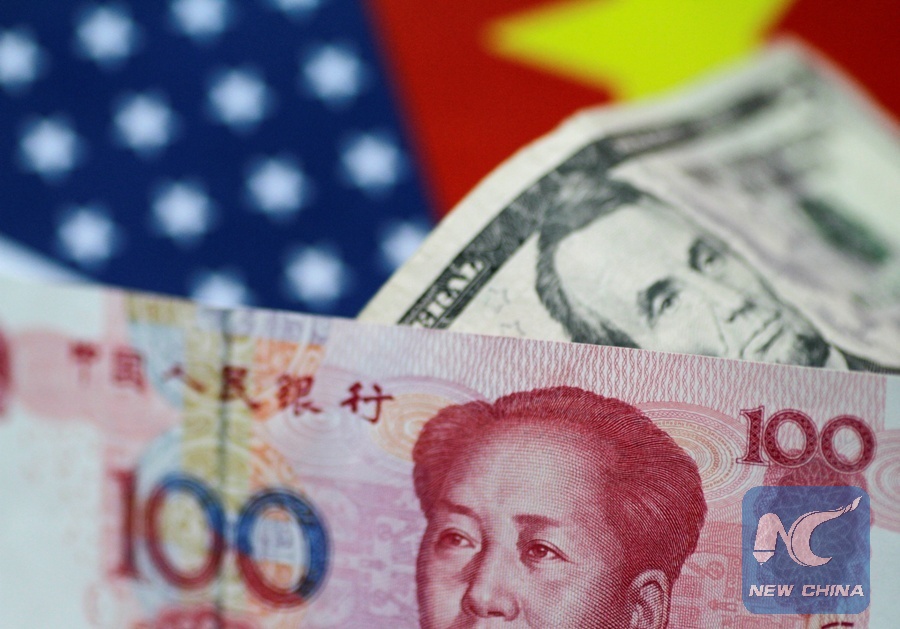
U.S. Dollar and Chinese Yuan notes are seen in this picture illustration June 2, 2017. (Xinhua/REUTERS)
WASHINGTON, April 10 (Xinhua) -- Chinese direct investment in the United States fell by more than 35 percent in 2017 due to policy shifts in both countries, according to a new report jointly released on Tuesday by the National Committee on U.S.-China Relations (NCUSCR) and the Rhodium Group.
The value of consummated Chinese direct investment transactions in the United States dropped to 29 billion U.S. dollars in 2017, down from a record 46 billion dollars in 2016 and marking "the first major correction in a decade."
The value of newly announced Chinese acquisitions in the U.S. also plunged by 90 percent from a year earlier and the impact from such decline in investment had been felt on the local level, according to the report.
"Planned greenfield projects were delayed, fewer jobs were added to Chinese payrolls compared to previous years and some Chinese companies even began seeking buyers for their U.S. assets," the report said.
The report attributed the decline in Chinese investment last year to two factors driven by policy shifts in both China and the United States rather than commercial dynamics.
On the one hand, Chinese regulators strengthened tighter supervision of large private conglomerates' outbound investment activities as part of a broader effort to reduce leverage in China's financial sector, while putting a brake on "irrational" outbound investment deals.
On the other hand, the Committee on Foreign Investment in the United States (CFIUS), a multi-agency panel that reviews foreign purchases of U.S. companies, has broadened its approach to reviewing Chinese investments.
"This partially reflects long-standing scrutiny of Chinese investments in high-tech sectors relevant to defense but is also a result of new concerns such as investments in emerging critical technologies and companies that possess large troves of U.S. citizens' personal data," the report said.
An unprecedented number of Chinese deals were delayed or abandoned last year as parties failed to obtain approval from the CFIUS, it added.
The report comes as the Trump administration and U.S. lawmakers are seeking tighter scrutiny of Chinese investment in the U.S. through a significant expansion of the CFIUS.
"A revamped CFIUS could not only deter high-tech acquisitions but also reduce Chinese greenfield FDI (foreign direct investment) in R&D centers and other innovative activities in certain areas," the report warned.
Adam Posen, president of the Peterson Institute for International Economics (PIIE), a Washington D.C.-based think tank, said it's "stupid and self-defeating" for the United States to expand the scope of CFIUS review to broadly restrict Chinese investment.
"Our institute has done a lot of research, which shows that foreign direct investment, whether inward or outward, is the good kind of capital flows," Posen told Xinhua, adding that FDI in the U.S. tends to create higher paying and value added jobs and bring more R&D into the United States.
"It is critically important that the United States remains an open market for investment," echoed Stephen A. Orlins, president of the NCUSCR.
"When investments are denied, there are very real trade-offs with asset valuations, as well as job and economic growth," he said, noting over 150,000 American jobs are now supported by Chinese investment.
Henry Levine, senior advisor at leading U.S. consulting firm Albright Stonebridge Group, also said it's "a bad thing" to expand CFIUS authority to deal with technology transfer concerns as they' re already covered by the existing U.S. export control laws.
"Even under the new CFIUS regulations, I still think that the vast majority of Chinese investment in the U.S. will not be affected," Levine told Xinhua, noting Chinese investment in the areas of hotels, solar and automobile production would not be touched by the CFIUS.
But Posen said Chinese tech companies could skip the United States to boost investment in Europe and Japan if they face higher cost of doing business here.
"We know there are some Chinese tech businesses that are doing big sales, a lot of joint ventures investment in Europe and even Japan," he said.
According to the report, the cumulative value of U.S. FDI transactions in China reached 256 billion dollars by the end of 2017, while the cumulative Chinese FDI in the U.S. totaled 140 billion dollars by the end of last year.
"At its heart, investment requires long-term commitment in a way that trade does not, creating productive business relationships and driving people-to-people connections," said Orlins.
"Bilateral investment is truly 'win-win' when allowed to thrive, providing needed ballast to the relationship in both good and challenging times," he noted.

